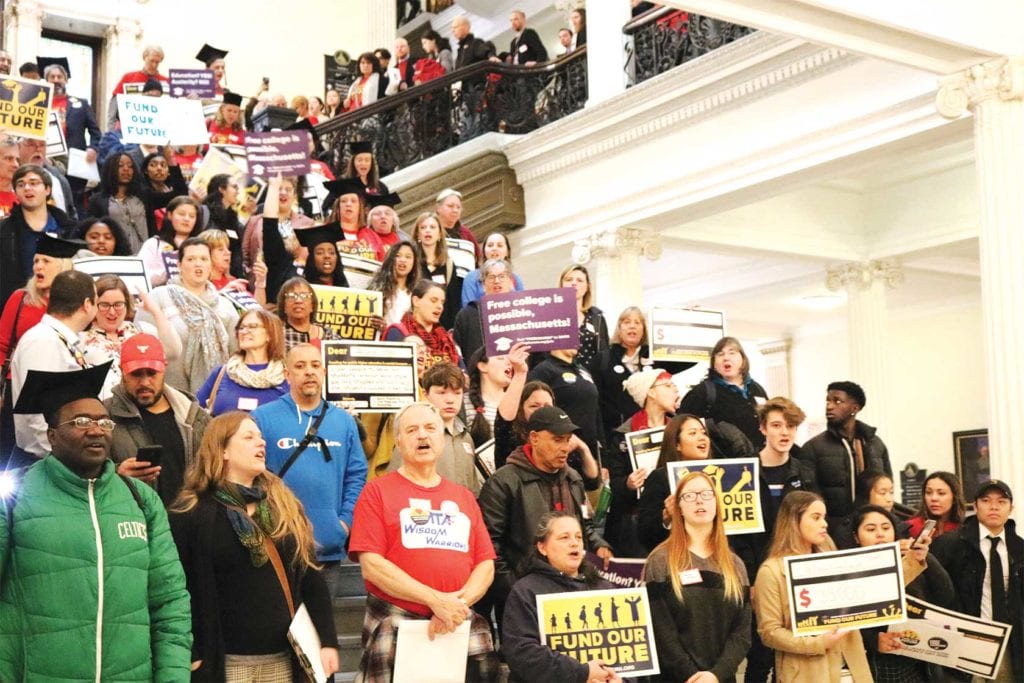College students march on State House
The “Fund our Future” campaign aims to ensure a debt-free future for students and families

Students, parents and employees from all across Massachusetts marched through the State House on Monday in support of increased funding for public colleges and universities. The “Fund our Future” campaign, which is endorsed by organizations across the state, aims to ensure a debt-free future for students and families.
“We’re here because our campuses are crumbling,” said Zac Bears, executive director of the Public Higher Education Network of Massachusetts (PHENOM). “We’re here because people can’t afford to go to public college in the richest state in the richest country in the history of the world. We can fix that.”
The Cherish Act, aimed at allocating more resources to higher education, would restore $600 million to public colleges and universities over the next five years. The funding has decreased since 2001, and this act would bring the state back to its previous levels. The advocates also hope to pass $120 million of the total amount during the Fiscal Year 2021 state budget in order to halt the continuously increasing tuition and fees.
The Debt-Free Future Act aims at protecting students from the often inevitable consequences of student loans. The act notes that student debt has grown faster in Massachusetts than in 49 other states since 2001. The average UMass student graduates with over $30,000 in student debt.
Hundreds of thousands of college students are forced to work extra jobs every year to provide for themselves and their families. Meghan DeVeau, the Student Government Association vice president for Salem State University, said that she works three jobs.
“I call myself a typical college student, because my boyfriend works three jobs. Everyone I know totals their work hours to 35-40 hours a week,” she said. DeVeau said that she manages her clubs, schoolwork and sorority along with her jobs.
“You’re probably about to say what my friends and family tell me all the time: It’ll make you stronger, a better worker,” she said. “No it doesn’t. It makes us struggle.”
DeVeau noted that 35% of students at Salem State are first-generation students. That amounts to thousands of students who support family members without college degrees.
DeVeau said that it breaks her heart to see “bright young minds fizzle out” because they don’t have state-funded resources.
Cameron Costa, a student organizer from Bristol Community College, shared his experience being raised by a single mother in a low-income, Puerto Rican family. He said that his mom taught him the importance of education, even moving to Massachusetts to make sure that her children grew up with good public schools.
From a young age, Costa knew the importance of education. But when he completed his FAFSA, or the Free Application for Federal Student Aid, the federal funding didn’t cover much of his costs. His mother was still required to pay $25,000 to send her children to school.
“It felt like a punishment,” he said. “The government didn’t consider that my mother worked 80 hours Monday through Friday to move us out of the projects. It seemed like all they cared about was the fact she made a certain amount of money, enough to pay an additional $25,000 to send her two kids to school, which in reality was just enough to sustain [a] living.”
Costa was involved in seven clubs throughout high school, and spent countless hours doing community service. He even graduated with a 3.91 GPA. But when he applied for dozens of scholarships, he only received four.
State Rep. Natalie Higgins said that students can do everything right and still come up short. Too many students cannot afford college even after spending years perfecting their grades.
Higgins also said that Massachusetts has always claimed to be a leader in public education, but the funding should apply to students regardless of their year in school.
“And that is what your job is here today,” she told the advocates. “To make sure everyone in this building understands the value of investing in public higher education.”
Sigrid Schmalzer, a representative from UMass Unions United Coalition, said that student debt weighs on people for years.
“More and more employees are starting their jobs, starting their careers, with student debt. Student debt that students have becomes student debt that employees have.”
Schmalzer said that working conditions improve learning conditions. She said that student anxiety is through the roof, as many deal with issues like housing equity, minimum wage jobs, climate change and systemic racism.
“These are structural problems,” said Schmalzer. “And the solution to these structural problems is publicly funding our public needs and safeguarding well-paid, secure union jobs.”
Bears also noted the importance of protecting school employees.
“Staff and faculty, many are overworked, underpaid,” he said. “We’re seeing program cuts, budget cuts, and rising tuition and fees and rising student debt. All of this is wrong. All of this can be stopped. And all of it, at least most of it, comes from choices that are made in this building by the people we are trying to reach out to.”
Bears rallied the students with cheers.
“We’re here for public higher ed,” he said. “But our movement is about intersectional justice for everyone.”







